
- Undergraduate
- Research
- About the Program
- News & Events
- People
Back to Top Nav
Back to Top Nav
Back to Top Nav
Back to Top Nav
All students writing honors theses in the Program in Quantitative Social Science (QSS) at Dartmouth College are required to publicly defend their research upon completion of their projects. In the first three weeks in May, 12 students presented their theses. Each QSS thesis is guided by a primary faculty advisor, and in addition a second reader is assigned to evaluate each thesis. Professor Michael Herron, who is the Chair of QSS, worked with all of the QSS thesis students over the course of the 2022-23 academic year.
This year's QSS theses are as follows:
Maxwell Blum: Information diffusion in online social networks: a simulation experiment (Simulated networks of online information diffusion)
Devan Fink: Team Versus Player? A Study of Baseball Salary Arbitration and the Arbitrator Exchangeability Hypothesis
Joshua Freitag: Perceptions of Jury Impartiality and Court Legitim
Henry Jin: Enough is Enough? Exploring how an Increase in Irregular Border Crossings affects Canadian Public Attitude Towards Immigration and Welfare
Abigail Johnson: Designing Public Transit for Equitable Access to National Forests
May Khine: How were COVID-19 vaccination attitudes on Twitter between and within racial groups affected by major socio-political events?
You-Chi (Eunice) Liu: Impact of Multi-Disciplinary Cancer Consultation (MDCc) on Early-Stage Lung Cancer Patients' Access and Timeliness of Care
John Petrich: Dollarization and Trade in Latin America
Amar Scherzer: Using Infectious Disease Simulations to Recreate and Quantify the Impact of Vaccination and Self-Quarantine on Mpox Spread across the United States.
Philip Surendran: Quantifying implicit bias: a natural language processing analysis of judicial opinions
Sathya Thenappan: Exposure to daylight and its impact on the physical and mental well-being of college students
Camille Wiggins: Physician-Provider Race and Gender Relations; Race and Gender Concordance, Its Implications on Clinical Trials